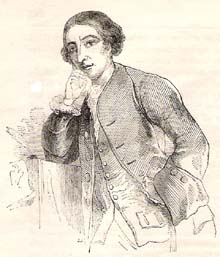Horace Walpole
Writer of gothic novels and resident of Strawberry Hill
1717 - 1797

A tendancy to plagiarise
Horace Walpole wrote to his cousin Henry Conway* on 8 June 1747, shortly after he had taken possession of Strawberry Hill still known then as 'Chopped Straw Hall'. He described the place and the stream which ran through it in some detail as:
A small Euphrates through the piece is rold
And little finches wave their wings in gold.
(Note: Sometimes written as of gold when quoted by later writers.)
This romantic description, with its arcadian undertones, is often taken as an example of Walpole's facility for elegant description. It is actually no more than an example of his tendency to plagiarise. Walpole did not write the lines himself: they were adapted from Alexander Pope's Epistle To Mr Addison, occasioned by his Dialogues on Medals and first published in 1720. This poem is about the images of the departed Roman empire as depicted on ancient medals and coins:
Con vinc'd, she now contracts her vast design
And all her triumphs shrink into a coin:
The lines used by Walpole were extracted from a passage commemorating the conquests of various Caesars in the region of the Rhine, the Nile and the Euphrates Rivers:
The Medal, faithful to its charge of fame,
Thro' climes and ages bears each form and name:
Although set in the letter in a fashion suggesting that they were a quotation, Walpole did not acknowledge that the lines were Pope's, on a totally different subject. He needed, too, to alter what Pope had written, which was:
A small Euphrates through the piece is roll'd
And little Eagles wave their wings in gold.
without appreciating, or possibly caring, that Pope was describing military victories struck (roll'd) on a gold coin (piece), rather than a piece of land with its bird-life. Walpole then had to convert imperial Roman eagles into finches.
Later in the same letter Walpole wrote that Pope's ghost is just now skimming under the window by a most poetical moonlight.” Well he might!
* Note: Col the Hon Henry Seymour Conway, Walpole's cousin, was at this time experiencing campaign life in Flanders during the war of the Austrian succession, with France. Walpole's sybaritic description of his new abode must have offered a sharp contrast with a soldier's life in the field.
Further reading:
The Poems of Alexander Pope, A one-volume edition of the Twickenham text with selected annotations, p215. Edited by John Butt, Methuen 1963.
W S Lewis. Horace Walpole's Correspondence, vol 37, p269. Yale, 1937-1983 (a footnote contains, without comment, the equivalent passage from Pope)




